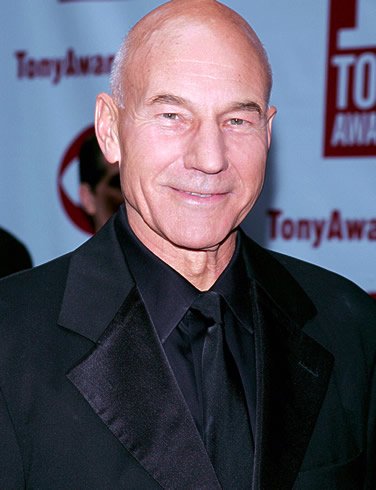
Actor Patrick Stewart (of Star Trek fame, and much else) has unwittingly stumbled on the truth about individual rights. Or more precisely: stumbled over the truth.
It all started when Belfast (Northern Ireland) gay rights activist Gareth Lee wanted a picture of Bert and Ernie on a wedding cake, along with the supportive same-sex slogan. The bakers at first accepted the order, then called two days later to cancel, citing their religious beliefs, the Huffington Post reports.
Members of the McArthur family, the bakery’s owners, are appealing their case, insisting, “We have done nothing wrong as we have discriminated against no individual but rather acted according to what the Bible teaches regarding marriage.”
Stewart said he’d been following the case, and wrestling with the issues involved. “Finally, I found myself on the side of the bakers,” Stewart told Newsnight. “It was not because it was a gay couple that they objected. It was not because they were celebrating some sort of marriage or an agreement between them. It was the actual words on the cake that they objected to, because they found them offensive.”
“I would support their rights to say, ‘No, this is personally offensive to my beliefs, I will not do it.'”
This will get Stewart in hot water with gay rights activists in Ireland, the USA and elsewhere. But why?
The problem here is with the concept of “gay rights.” It’s the same problem as any form of “rights” other than individual rights. Only individuals have rights. To say that “gays” have rights is to imply that gay persons — as a group — have rights over and above the rights of individuals.
Your standing as an individual is more significant than any other standing you have. Your gender, your racial ancestry, your cultural identification, your sexual orientation, your membership in any association or group — these are all part of who you are, and they’re perfectly important in certain ways. But you are first and foremost an individual. That’s just a fact. And the law must respect this fact, by treating everyone as an individual, and holding everyone’s status as equal individuals under the law.
Unknowingly and haltingly, Stewart is challenging the idea of group rights. He’s implying, without fully saying it, that the individuals who own and operate the bakery have a right to make or not make any cakes they choose. Professionally, they could have handled the case better, in that they should have said “no” from the beginning; but that’s not the main point. The main issue is they are not slaves to the government, to gays as a group, nor to any other group or individual.
Put it that way — “they’re not slaves” — and most people will probably agree. Of course the bakers are not slaves. But the advocates of “gay rights” come in, at this point, and claim, “Gay people have a right to have a cake made for them, if it suits their interests and desires. Otherwise, you’re denying them their rights.”
What rights are being denied here? The gay individuals are free to go elsewhere to find a baker who is more than happy to bake them a cake of any style they choose. They almost certainly will find one. What if nobody will make them the cake? This will be a problem for them; they might even have to bake the cake themselves, or even go without a professionally made cake. This hardship or disappointment in no way puts an obligation on others to bake a cake for them they don’t wish to bake. If it did, then it would mean that the bakers are gay people’s slaves, in this context. That’s involuntary servitude.
I recognize that Ireland has a different form of government, and does not have America’s Constitution. That’s not my point. My point is what’s morally right and just.
Patrick Stewart does contradict himself. In his comments, as well as the comments of the Irish bakers defending themselves, a distinction is made. Both Stewart and the bakers imply: While it would be wrong to discriminate against gay people, there’s nothing wrong with upholding your religion.
What’s the difference? If your religious belief tells you that something is wrong, then — as a consequence — you will discriminate against people based on that belief. So what? That’s your right, so long as you don’t physically impose force on them, or cheat them out of a contract you both signed.
It’s the same individual right the gay baker would have not to bake a cake honoring the Moral Majority or a Republican candidate for President who’s against gay marriage. Activist Gareth Lee would be outraged if a gay-owned bakery were forced to bake a cake for a customer who wanted to uphold anti-gay views. Why do one set of individuals get rights that other individuals do not?
Stewart, to his intellectual credit, senses the inconsistency here, while not going all the way in making the distinction between individual and group rights. To the credit of his character, he says what he thinks, and defends the private business owners, despite the condemnation and intimidation he will get from those who dislike his frankness and honesty.
There is no such thing as “gay rights” because rights apply to individuals, not groups. Only individual rights exist. We all possess individual rights equally.
Until or unless people start to grasp or accept this fact — which is spelled out pretty clearly in the Declaration of Independence, by the way — we will continue to force each other into involuntary servitude. Legal or not, it will never be right. Not in Ireland, not in the United States … not anywhere.
Be sure to “friend” Dr. Hurd on Facebook. Search under “Michael Hurd” (Rehoboth Beach DE). Get up-to-the-minute postings, recommended articles and links, and engage in back-and-forth discussion with Dr. Hurd on topics of interest. Also follow Dr. Hurd on Twitter at @MichaelJHurd1
